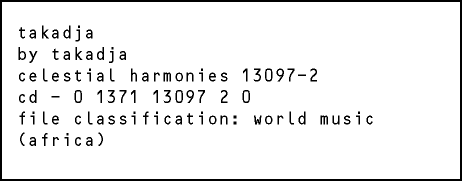 |
||||||||||||||||||||||||||||||
 
Unter der Leitung der franko-kanadischen Perkussionistin
Francine Martel singt und spielt die schwarz-weiße Gruppe neu
arrangierte Stücke aus der Tradition Senegals und Guineas. Zu
den gleichmäßig fließenden Rhythmen weben die afrikanische
Harfe Kora und Xylophone melodisch-harmonische Muster. In Kanada als
beste Weltmusikplatte 1995 ausgezeichnet.
1995 Juno Award Winner for Best Global Album the projectTakadja means to vibrate while dancing in
the Guéré language of the Ivory Coast. It also describes how the music
of West Africa affects listeners, especially when played by an international
ensemble of percussionists, dancers and vocalists who mix equal doses
of ecstatic virtuosity, technical precision, and respect for tradition,
with the passion that comes from truly celebrating life.
Takadja's self–titled debut on Celestial Harmonies is filled with many of the infectious grooves, jubilant songs and vivacious, polyrhythmic drumming sessions that have thrilled audiences during the group's numerous festival and television performances. The Montréal-based ensemble is comprised of artists from Canada, Senegal and Guinea, all of whom have studied with master musicians throughout West Africa. They bring with them direct experiences of music's role in traditional culture, as well as a seasoned knowledge of the instruments of that region. The richly-hued sounds of the xylophone-like balafon and the scintillating strummings of the balafon kora, a twenty-one string harp-lute, originally entertained Malinké royalty. The thick, hollow sounds of the balafon kirin logdrum, on the other hand, were used to send messages between villages in the densely forested regions of Guinea. The intricate rhythms and timbres of the djembé drums were an integral part of rite-of-passage fiestas commemorating marriages, baptisms and circumcisions. Dialogue De Djembés, a drum concert first orchestrated by the legendary drum-master, Sékou Camara Cobra, combines rhythmic sentences from various ethnic groups in Guinea, Senegal and the Ivory Coast. Takadja is dedicated to the memory of this inspirational musician, dancer and singer who died in 1994. This recording was produced by Steve Roach. the artistsFor fifteen years,
discographytracklist
|
||||||||||||||||||||||||||||||
|
|
||||||||||||||||||||||||||||||
 |


